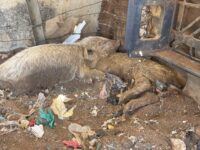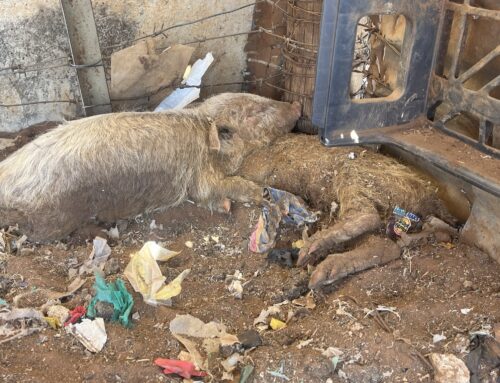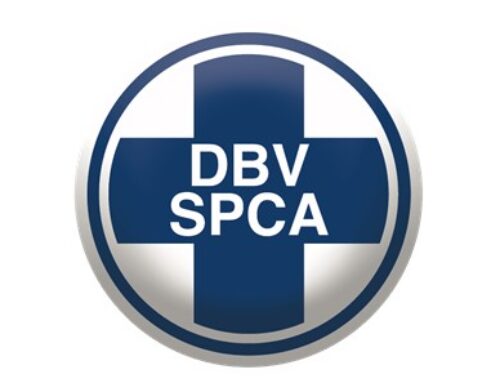On 18 July 2024, the NSPCA’s Special Projects Unit conducted a proactive inspection at an animal welfare organisation in the Eastern Cape. This shelter, which cannot yet be named as criminal charges are pending, was found to be violating various sections of the Animals Protection Act 72 of 1962. The owner of the shelter had left the care of several cats and dogs in the hands of an untrained volunteer. Not only were the animals in her care found to be living in deplorable conditions with various injuries and illnesses, but it was soon discovered that the shelter wasn’t even registered as a non-profit organisation. Nonetheless, the volunteer had actively been collecting donations from the public and raising funds to support the continued neglect and abuse of the animals in her care.
Local businesses and supermarkets regularly donated money and food. Cats and dogs alike were being fed a daily diet of mielie-pap and chicken. The property was also occupied illegally by the shelter. Stuffed into tiny cages and left to their own devices, it was apparent that the shelter was unable to give these animals the care they needed and deserved.
It was obvious that the cages hadn’t been cleaned in weeks, perhaps months. Dried faeces and urine caked the floors and algae blanketed the shallow pools of what was meant to be drinking water. If one had to come across the same situation in the home of a member of the public, one would automatically think ‘hoarder’. However, because this occurred at a ‘no-kill’ shelter, donations flowed freely, allowing for this cruelty to continue unabated.
Unfortunately, many self-proclaimed animal rescuers will defend these types of situations, insisting that they are doing what’s best for the animal. What they won’t tell you is that, in these cases, many basic and vital needs such as veterinary care, sterilisation, space, and welfare are not taken into consideration, leaving the animals to suffer.
The NSPCA is pro-quality-of-life. Many of the animals abandoned at no-kill shelters are left to waste away in conditions one can only describe as inhumane. While pro-life shelters boast a zero kill-rate, it is the open-admission, pro-quality-of-life shelters that are left to pick up the pieces, to open their doors to the surrendered, injured, abused, abandoned, and stray animals that will be turned away from the invariably overflowing no-kill shelters. It then falls to open-admission shelters to make that tragic decision to give a suffering animal the dignity of a peaceful and painless death.
The use of the no-kill moniker is deceptive. No-kill shelters create more kills, but this time those deaths are slow and painful. Animals in no-kill shelters may take a lifetime to die, crammed into small cages, and subjected to the diseases, fighting, and mental distress imposed by confinement. Or they are turned away from over-full shelters to be abandoned by their owners who may have no other option. Abandoned and discarded like unwanted objects and left to starve and suffer, is a slow and painful death better than a quick and painless one?
Instead of focusing on a no-kill policy, animal welfare organisations should be banding together to focus on strategies that target the overpopulation of animals, specifically sterilisation campaigns, adopting rather than ‘shopping’, and the support of shelters with formal, sensible euthanasia policies. As Ingrid Newkirk puts it, let’s promote a ‘no-birth’ policy, rather than a ‘no-kill’ one. Only once the overpopulation problem is resolved, can a no-kill policy have any benefit.
The Eastern Cape shelter is under investigation by the NSPCA and prosecution will follow. Follow-up inspections will be conducted. Unfortunately, once again, the NSPCA is left to pick up the pieces, to literally ‘clean up the mess’ left by glorified hoarders, all the while being berated for taking a pro-quality-of-life stance.
If you are as passionate about animals and their well-being as we are, consider supporting our causes by donating.
Latest News Posts
Will You Be the One Who Takes Action?
Most people will scroll past this. But will you be the one who stands up for animals?
Animal welfare isn’t always in the spotlight, but it changes lives – for every neglected, abused, or suffering animal we help. Our teams work tirelessly, often behind the scenes, ensuring animals across South Africa are protected.
This work is relentless. The challenges are immense. But with more hands, hearts, and resources, we can do even more.
The equation is simple: the more supporters we have, the greater our reach, the stronger our impact.
Be part of the change. Become an NSPCA Project Partner today. From just R50 per month, you can help ensure that no animal suffers in silence.








